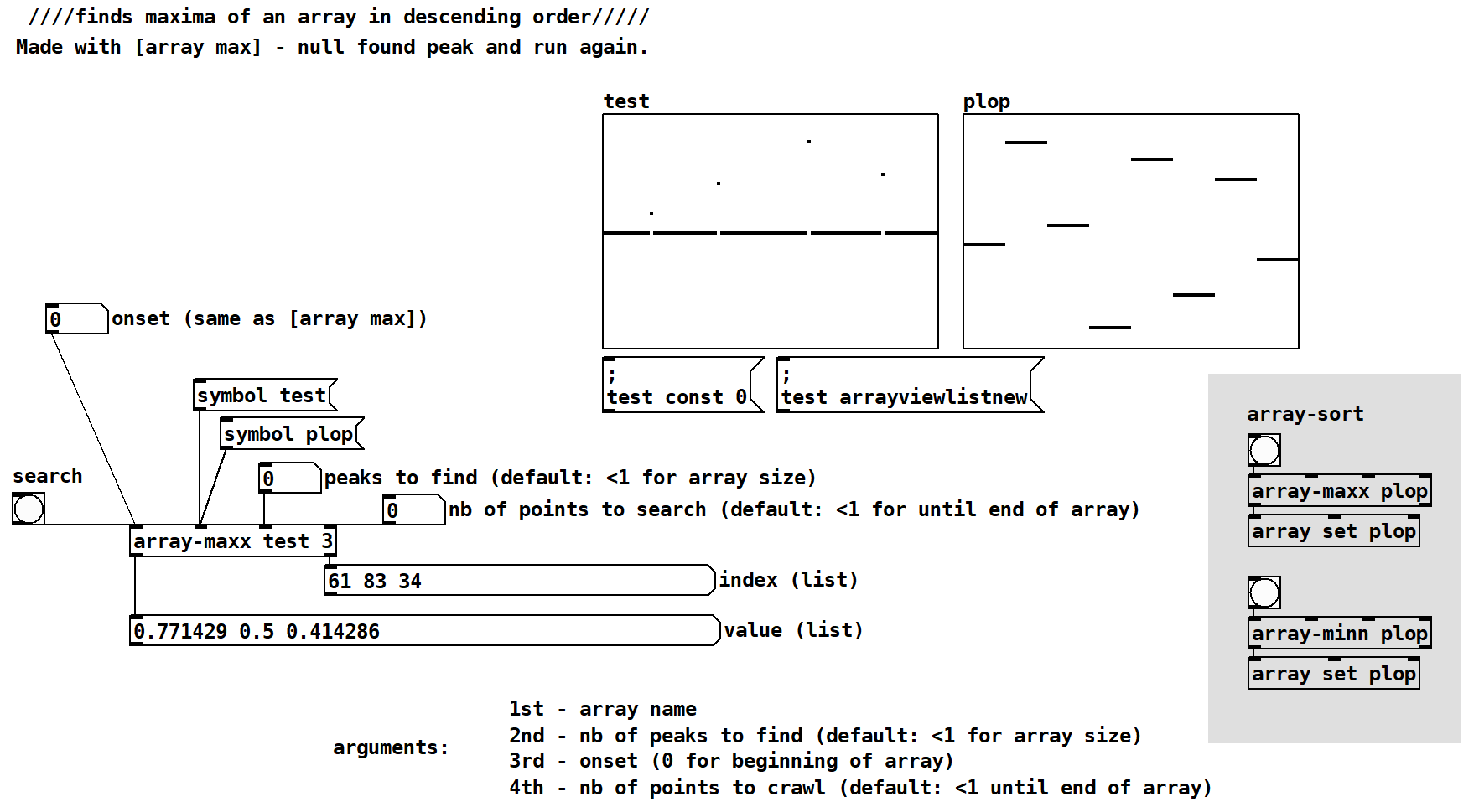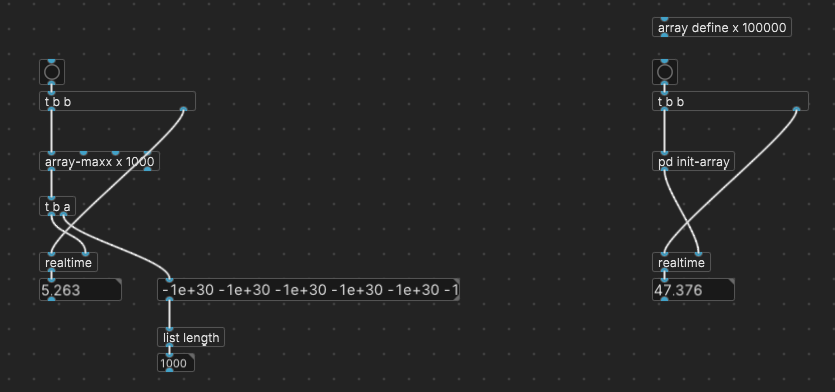Vanilla abstraction, made with [array-max] and [array-min] by nulling found peak and run again.
array-maxx.pd
array-maxx-help.pd
array-minn.pd

array-maxx and array-minn - get multiple peaks of an array / does array-sort
Vanilla abstraction, made with [array-max] and [array-min] by nulling found peak and run again.
array-maxx.pd
array-maxx-help.pd
array-minn.pd

@lacuna Cool idea --
I was curious about performance, so I made a little benchmarking patch.
Over to the right, there is a button to initialize the array to 100000 random values between 0 and 999999. In plugdata, this took 35-50 ms; in vanilla, about 14 ms. (2-3x performance degradation in plugdata is... a curious thing, but not relevant to the performance of the abstraction.)
Then I ran [array-maxx x 1000] on it, and found that it took 3-5 ms to do the 1000 array scans... which I found confusing: why would 100,000,000 array accesses be an order of magnitude faster than 100,000 array writes? (Sure, it's 1000 times the [array max] primitive, but I didn't expect so much faster.)
Then I had a look at the results, which were all -1e+30, your sentinel value. It's doing the right number of iterations, but not yielding good data.
That makes me suspect that [array-maxx] might, on my machine, not be doing the work, and thus finishing early... a bug? Version mismatch?

(Specifically, what I was wondering about performance is, which is faster? To scan the entire input array n times, with each scan in a primitive, or to scan the input array once and manipulate the output list per value? I might try that later, but I'd like to be sure [array-maxx] isn't malfunctioning first. I'd guess, if the input array is large and n is small, the second approach could be faster, but as n gets closer to the input array size, it would degrade.)
hjh
@ddw_music Oh! Thank you! Yes, a minimal change in loading the 4th argument caused the bug! Moses! I might not have tested before uploading... blushing!!! Now I reuploaded it. Thank you
And this is quite slow... it is actually very slow. Wondering about a different approach.
@lacuna Ah ok -- I guessed it would be easy to fix. Will try it tomorrow.
Cheers!
hjh
Actually I tried it a bit sooner -- works fine.
I also tried the single-array-iteration approach, and... managed only to lock up my computer, twice... at which point... I see clearly why many really interesting projects in patching environments embed JavaScript or Lua, because the type of algorithm that I described is straightforward in code, but something close to horrifying to try to build with pure patching objects. Patching is great for UI response but for algorithms... there's a point where I just don't have time for it, unless it's really critical.
I'm still curious about the performance comparison, but I can do it in 15-20 minutes in SuperCollider, whereas tonight I was at it for more than an hour in Pd and no good result. This is not an essential inquiry so I won't continue this way 🤷🏻♂️
hjh
OK, so, some benchmarking results.
In Pd, given a 100000-element input array and asking [array-maxx] for 1000 output values, I get what seems to be is a valid result in 99 ms... which is not very slow. (Pd gains performance here from the fact that [array max] is a primitive. If you had to run the array-max iteration by [until], it would be much, much slower.)
I did try it in SC. The [array-maxx] algorithm is extremely, brutally slow in SC because SC doesn't have an array-max primitive. The 100000 x 1000 = 100,000,000 iterations take about 3.6 seconds on my machine. Ouch.
The algorithm I described (iterate over the source array once, and insert items into the output array in descending order) is 5-6 times faster than Pd, and a couple hundred times faster than the SC brute force way. I did two versions: one uses the SC array insert primitive; the other uses only array get and put.
a = Array.fill(100000, { 1000000.rand });
(
f = { |a, n = 1000|
a = a.copy;
Array.fill(n, {
var index = a.maxIndex; // Pd equivalent [array max] is much faster
var value = a[index];
a[index] = -1e30;
value
});
};
g = { |a, n = 1000|
var out;
var index;
a.do { |item|
if(out.size == 0) {
out = [item];
} {
index = out.size - 1;
while {
index >= 0 and: {
out[index] < item
}
} {
index = index - 1
};
// now index points to the latest item in the array >= source item
if(index < (out.size-1) or: { out.size < n }) {
// insert after 'index' and drop excess smaller items
out = out.insert(index + 1, item).keep(n)
}
}
};
out
};
h = { |a, n = 1000|
var out;
var index, j;
a.do { |item|
if(out.size == 0) {
out = [item];
} {
index = out.size - 1;
while {
index >= 0 and: {
out[index] < item
}
} {
index = index - 1
};
if(index < (out.size-1) or: { out.size < n }) {
// index = index + 1;
if(out.size < n) {
// if we haven't reached n output values yet,
// add an empty space and slide all items after 'index'
j = out.size - 1;
out = out.add(nil);
} {
// if we already have enough output values,
// then 'item' must be greater than the current last output value
// so drop the last one
j = out.size - 2;
};
while { j > index } {
out[j+1] = out[j];
j = j - 1
};
out[index + 1] = item;
}
}
};
out
};
)
// brute force O(m*n) way
bench { f.(a).postln };
time to run: 3.592374201 seconds.
// single-iteration with array-insert primitive
bench { g.(a).postln };
time to run: 0.13782317200003 seconds.
// single-iteration without array-insert primitive
bench { h.(a).postln };
time to run: 0.21714963900013 seconds.
I might have another stab at it in Pd. Note that you can't directly compare the Pd and SC benchmarks because the "language engine" isn't the same -- there's no guarantee of getting Pd down to 20 ms -- but, can probably do better than ~100 ms.
hjh
Tried again, as an exercise.
Failed.
[array max] is so fast that any alternative will be slower. (Or, array indexing in Pd is so much slower than in SC that it pays off to avoid it.)
And I had some bug where it omitted a value that it should have kept.
So I'm done. If I need to do something like this again another time, I'd have to use a scripting object. Too frustrating.
Here's as far as I got (with a little debugging junk still left in) -- array-maxx-benchmarking-2.pd -- any other insight would be nice, I guess? For closure.
hjh
Updated the patches:
Fixed 2 bugs:
Whole array size as default output.
Now also works if array-size changed.
And cleaned up messy counter.
Added array-sort example to helpfile, changed thread title.
@ddw_music This was also my second try, giving up the first. And my thoughts where similar, especially if LUA would be handy here? I did not care too much about speed as I don't need this for realtime. Anyway an object written in C would be faster.
(This array-sort is much faster than [list-abs/list-sort], did not try [text]sort.)
Still I don't understand your idea of building a list without rescanning the array or list for each peak? But don't worry if you are done with it ... If I only had known how much time I spend with this ....
@lacuna said:
Still I don't understand your idea of building a list without rescanning the array or list for each peak?
Sure. To trace it through, let's take a source array A = [3, 5, 2, 4, 1] and we'll collect 3 max values into target array B.
The [array max] algorithm does 3 outer loops; each inner loop touches 5 items. If m = source array size and n = output size, it's O(m*n). Worst case cannot do better than 15 iterations (and best case will also do 15!).
My suggestion was to loop over the input (5 outer loops):
Finished, with B = [5, 4, 3] = correct.
This looks more complicated, but it reduces the total number of iterations by exiting the inner loop early when possible. If you have a larger input array, and you're asking for 3 peak values, the inner loop might have to scan all 3, but it might be able to stop after 2 or 1. Assuming those are equally distributed, it's (3+3+3) / 3 = 3 in the original approach, vs (3+2+1) / 3 = 2 here (for larger output sizes, this average will approach n/2). But there are additional savings: as you get closer to the end, the B array will be biased toward higher values. Assuming the A values are linearly randomly distributed, the longer it runs, the greater the probability that an inner loop will find that its item isn't big enough to be added, and just bail out on the first test, or upon an item closer to the end of B: either no, or a lot less, work to do.
The worst case, then, would be that every item is a new peak: a sorted input array. In fact, that does negate the efficiency gains:
a = Array.fill(100000, { |i| i });
-> [0, 1, 2, 3, 4, 5, 6, 7, 8, 9, 10, 11, ... ]
// [array-maxx] approach
bench { f.(a).postln };
time to run: 4.2533088680002 seconds.
// my approach, using a primitive for the "slide" bit
bench { g.(a).postln };
time to run: 3.8446869439999 seconds.
// my approach, using SC loops for the "slide" bit
bench { h.(a).postln };
time to run: 7.6887966190002 seconds.
In this worst case, each inner loop has to scan through the entire B array twice: once to find that the new item should go at the head, and once again to slide all of the items down. So I'd have guessed about 2x worse performance than the original approach -- which is roughly what I get. The insert primitive helps (2nd test) -- but the randomly-ordered input array must cause many, many entire inner loops to be skipped, to get that 2 orders of magnitude improvement.
BUT it looks like Pd's message passing carries a lot of overhead, such that it's better to scan the entire input array repeatedly because that scan is done in C. (Or, my patch has a bug and it isn't breaking the loops early? But no way do I have time to try to figure that out.)
hjh
FYI, an algorithm I was taught in school uses a heap-based priority queue for that B array. Makes it a bit faster in big-Oh terms.
@jameslo said:
FYI, an algorithm I was taught in school uses a heap-based priority queue for that B array.
Oh nice, I overlooked that one... the limitations of having zero formal training in CS. I actually have a pure vanilla float-heap abstraction already (https://github.com/jamshark70/hjh-abs)... lower values to the top. For descending order, I'd just negate on the way in and out.
hjh
Oops! Looks like something went wrong!